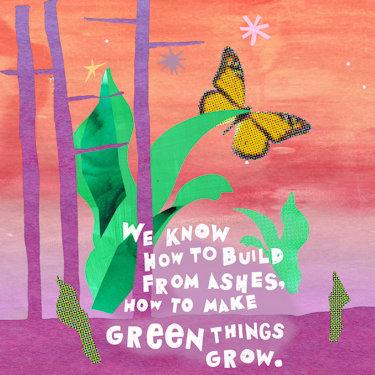 The thing about a Derek Jarman movie is when you find yourself crying you don’t know why you’re crying, not exactly. It’s the layering of everything. Like the memory of seeing his movies at the Castro Theatre in the early-‘90s when everyone was dying, we were watching or trying not to watch but we were watching, on and off-screen, yes, I found Derek Jarman as he was dying of AIDS.
The thing about a Derek Jarman movie is when you find yourself crying you don’t know why you’re crying, not exactly. It’s the layering of everything. Like the memory of seeing his movies at the Castro Theatre in the early-‘90s when everyone was dying, we were watching or trying not to watch but we were watching, on and off-screen, yes, I found Derek Jarman as he was dying of AIDS.
Torturers in Santa outfits, drinking champagne. The nuclear power plant on the beach, a yellow-green sunset, fires burning everything, spit on the glass, the clockwise and the counter, the lights as backdrop, the dropping of the back.
Ripping off the wig versus throwing off the wig. Hysterical laughter. The celebration of cruelty. The eroticism of brutality. The violence and camp, the violence in camp, the violence.
To flee in sequined dresses. To kiss the blood, to caress the decay, that sudden dance. The crossing and recrossing of the chest. Lip-synching toward and away from justice. Or do I mean feeling. I mean feeling injustice.
To run from the lonely shape of the everyday, the train tracks removed from the path of mourning. Every violence another violence. Ripping off the wig versus throwing off the wig.
The fog rolling in. Torches and the ocean. Every violence another technology. Hysterical laughter. Every violence another society. The garden of grief. The garden of hope. The garden of broken gnarled dead beauty.
All that water, all that sky, all that wind, all those clouds, all that color, everything moving so fast.
A ship that isn’t a ship, just a paper cutout in the background.
When every scene is an end, but there is no ending.
Call me, I want to say, I need to say goodbye.
Call me, I want to say, I need to see you to feel this is over.
Call me, I want to say, I can’t believe I made this mistake.
The mistake of our relationship, I mean I’m so wired I can’t think about anything except how could we be back to the beginning, like nothing ever happened, not eight years of intimacy and trust and sharing and caring, laughing and crying, holding and collapsing, how could someone so central to my support system suddenly be treating me like I’m not even there.
Yes, it’s 10:30 pm and I usually try to leave the house by 9 for my evening walk so I don’t get too wired before bed, yes, lately it’s been more like 9:15 but now it’s 11 and I’m on my walk anyway, at least the sidewalks aren’t icy tonight, usually when I’m late for my walk I go down the hill to Melrose and then back up, it’s a shorter walk than going to the park but I strained a muscle or a tendon in my right leg so I don’t want to walk down that steep hill because downhill is harder and anyway I need to go to the park if I have the energy and now that I’m outside I’m wired and everything is quiet and my head is clear. The blue light, the black light, the rose light. How much desire is too much desire. The rose light, the violet light, the gray light, static.
__
Mattilda Bernstein Sycamore is the award-winning author, most recently, of Touching the Art, out now from Soft Skull. Winner of a Lambda Literary Award and an American Library Association Stonewall Honor Book, she’s the author of three novels and three nonfiction titles, and the editor of six nonfiction anthologies.

3 comments
eutopia says:
Feb 10, 2024
Wow, what a poignant and emotionally rich exploration of Derek Jarman’s films and the complex layers of human experience. The vivid imagery and raw emotions depicted in this reflection truly captivate the essence of Jarman’s work. It’s a testament to the author’s ability to evoke deep empathy and introspection through their words. Truly impressive and thought-provoking writing.
Sahel says:
Apr 7, 2024
This line torches “when you find yourself crying you don’t know why you’re crying, not exactly.”
Danielle Lenhard says:
Apr 27, 2024
I feel the pang of this. That sudden attachment loss. That cut to static. Beautiful.